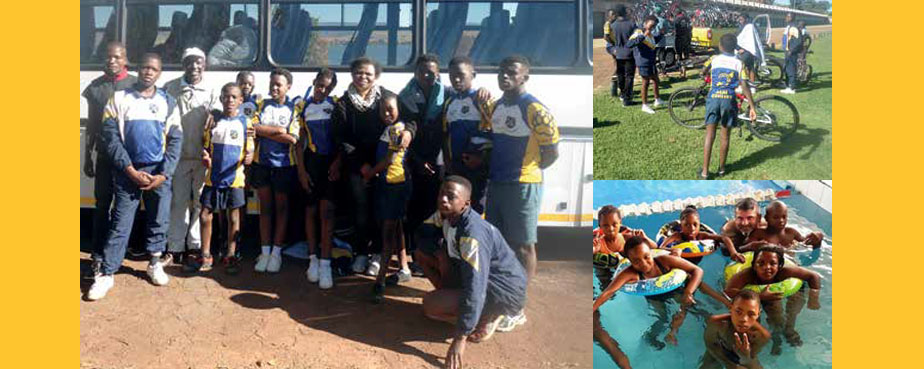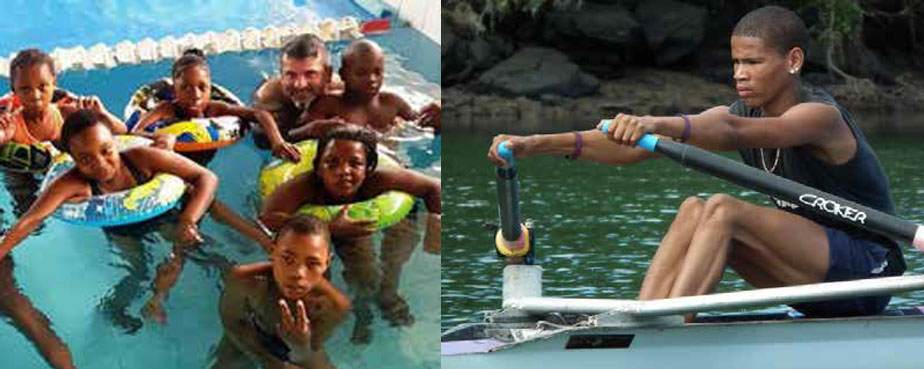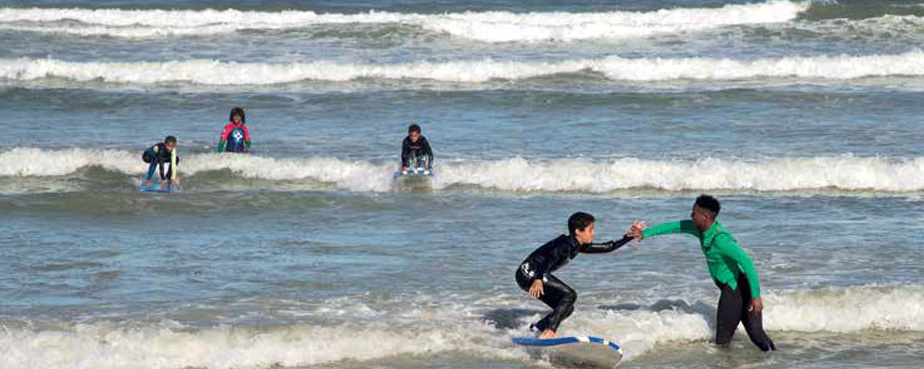CORPORATE CITIZENSHIP

A PROUD HISTORY OF SUPPORT FOR DEVELOPMENT SPORTS
Murray & Roberts is proud of its support for sports development projects and more importantly, the positive impact the finalists and winners
have had on their beneficiaries and extended communities over the 38-year history of the awards.
The JACK CHEETHAM AWARD provides financial support for development projects that have a focus on sport and assist able-bodied athletes.
The LETSEMA AWARD also provides financial assistance to development projects, but to differently-abled sports and athletes.
Robust Magazine went back to the archives and spoke to some of the previous winners and finalists to find out how the awards made a
difference to their organisations.
FULTON SCHOOL FOR THE DEAF
The Fulton School for the Deaf is a school that provides
specialised education for deaf children and has a 60-year
history in striving for excellence in deaf education. The school
takes children from the age of three and offers academic
classes up to Grade 12. They also offer specific education
for deaf learners who experience additional barriers to
learning through vocational and skills-based programmes.
The learners come from a variety of socio-economic
circumstances, with a high percentage exempt from payment
of school fees. The school relies heavily on fundraising to
ensure continued excellence and superior education for their
learners.
WHAT HAS BEEN ONE OF THE MOST IMPACTFUL THINGS THAT HAS
HAPPENED WITHIN YOUR ORGANISATION’S COMMUNITY?
Through the introduction of triathlon and cycling at Fulton
School, our learners and their families have been exposed
to a whole new world of healthy, competitive sport. Perhaps
the greatest impact achieved through our involvement in
triathlons, is the heightened level of awareness in the triathlon
fraternity to the potential and competitiveness of deaf athletes.
The inclusive nature of the sport and the potential for deaf athletes
to compete on an equal basis with their hearing peers, to form
friendships and push each other to achieve their full potential, has
resulted in awareness and social cohesion, the enormous impact
of which we will never fully realise. Not only
has it positively impacted our learners,
but our school coach, Mr Zakes Mkhize,
has gone on to introduce the sport
in his own community, as well
as introduce cycling in another
school for the deaf in Durban.
His passion for inclusive sport,
for triathlon and for equal
opportunities for children from
many backgrounds, make
him an outstanding coach
and fair referee. He has also
taken one of the school’s
groundsmen under his wing
and trained him as an assistant
coach.
HOW DID THE BENEFIT THE
ORGANISATION?
Since all the learners from our
school who participate in triathlon
and mountain biking generally
come from poor backgrounds, we rely on the use of
donated bicycles to give
them access to the sport.
We have been able to
use the funds provided by
the award to buy bicycle
spares so that we can
keep our equipment in
good order for longer. We
have also used it to cover
all event costs that our
learners participate in, as
their families are unable to contribute to such expenses. We were
also able to purchase all the necessary kit for our learners, as well
as safety equipment such as good quality helmets, so that the
children can participate professionally and safely.
WHAT IS YOUR HOPE FOR THE FUTURE OF YOUR ORGANISATION AND THE
WORK THAT YOU DO?
It is our hope that the deaf learners at Fulton School will continue
to have opportunities to shine in the sport of triathlon. We hope
that through continued hard work that some of them will achieve
provincial and national colours. One of our learners was placed third
in KwaZulu-Natal and we would like to see more learners excelling in
this sport. It would be greatly appreciated if a sponsor could come on
board to ensure the continued support of triathletes at the school, and
to ensure both sustainability and growth of the sport. In addition, we
hope to see expansion of the sport into more schools for the deaf.

MANDEVILLE AQUATICS DISABILITY SWIMMING CENTRE OF EXCELLENCE
The Mandeville Aquatics Disability Swimming
Centre of Excellence was the winner of the
2013 Letsema Award. The centre’s mission
is the development of swimming in Central
Gauteng’s disabled communities with a
focus on previously disadvantaged learners
from schools for the physically disabled.
TELL US ABOUT YOUR ORGANISATION
The majority of our members are
learners with disabilities from previously
disadvantaged communities and our primary
objectives are to teach swimming, develop
those with potential to a competitive level
and then coach them towards becoming
elite athletes.
WHAT IS THE BEST PART OF YOUR DAY WITHIN THE
ORGANISATION? Our elite swimmers enjoy training early in
the morning. They are in the water shortly
after 05:00 and then at school in time for
breakfast and assembly. They say the early
exercise sharpens their minds and enables
them to concentrate better in the classroom.
HOW DID THE LETSEMA AWARD BENEFIT THE
CENTRE? The injection of guaranteed funding gave
us the confidence to take a step up in the
facilities we could offer our swimmers,
including high performance offerings. This led
to more interest in swimming as a primary
sport for youngsters and was instrumental in
the growth and sustainability of the club.
WHAT HAS BEEN ONE OF THE MOST IMPACTFUL
THINGS TO OCCUR IN THE MANDEVILLE SWIMMING
COMMUNITY? Several of our swimmers have achieved
Provincial and South African colours. This
builds confidence and reflects on all the club
members. Many swimmers have also done
well after leaving school and are in good
careers. Most of them are adamant that
the self-discipline they developed through
training was instrumental in overcoming
challenges after school.
MANDEVILLE AQUATICS DISABILITY SWIMMING CENTRE OF EXCELLENCE
The Nemato Rowing Club has grown into a township-based youth empowerment
organisation called Nemato Change a Life and uses sport as one of its main tools. It
now has four sports clubs offering Olympic sports that were previously not available
in the township: rowing, tumbling and trampoline, handball and fencing. The club
won the Jack Cheetham Award in 2006.
WHAT HAS BEEN ONE OF THE MOST IMPACTFUL THINGS THAT HAS HAPPENED WITHIN YOUR
ORGANISATION’S COMMUNITY?
Community members started coming to our place saying things like: “We never
believed success was possible in our township, but now we see your athletes
becoming national champions and competing at world championships. It gives us
hope. We want to go back to education to make a success of our lives too.”
HOW DID THE JACK CHEETHAM AWARD BENEFIT THE ORGANISATION?
The award has been crucial to our survival and success. When our seed funder ran
away, were without any money to run the club. The award helped us to keep going
and provided a network that led us to our main funder, thereby helping us to grow
and develop to where we are now. Despite the many challenges, our members
have achieved both in sports and their careers. With very limited facilities, we have
national champions in all our sports, African champions in gymnastics and world
championship participants in gymnastics and handball. Althi, who accepted the
award in 2006, received a sports bursary from the University of Johannesburg,
where he became the first black captain of its rowing club. He has travelled the
world as a rowing coach and has been head coach and teacher at some of the top
schools in the country. He is now looking to move back to Nemato Change a Life to
help address the massive challenge of unemployment in our youth.
WHAT IS YOUR HOPE FOR THE FUTURE OF YOUR ORGANISATION AND THE WORK THAT YOU DO?
Our dream is to establish Nemato Youth Park, a youth empowerment and sports
centre. Our vision is that it will be the home of the national tumbling and trampoline
academy and offer a wide range of other Olympic sports with international potential
and be able to host top-level and international competitions, bringing much-needed
benefit to Port Alfred and contributing to the sustainability of Nemato.
WHAT ADVICE WOULD YOU GIVE TO OTHER ORGANISATIONS WHO ARE RECENT RECIPIENTS OF
THE AWARD OR WHO ARE THINKING OF APPLYING?
Count on 10 years of hard and persistent work before reaching the tipping point,
from surviving to prospering, but take that challenge and dream big, because there
is no greater and more humbling reward in life than knowing that most children
would not have been able to reach for their dreams and hopes without you.

MANDEVILLE AQUATICS DISABILITY SWIMMING CENTRE OF EXCELLENCE
Waves for Change provides surf therapy
programmes to vulnerable and differentlyabled
young people across South Africa.
The programme combines learning to surf
with evidence-based mind-body therapy
and is delivered by 60 trained local coaches,
all resident in the targeted communities.
Research with the University of Cape Town
has demonstrated that the Waves for Change
programme reduces violence, improves
emotional regulation and capacity to cope with
stress, and improves mental health outcomes.
WHAT IS THE BEST PART OF YOUR DAY?
The best part of our week is always working
with our locally trained mentors. These are 18 to 28-year-olds who
deliver our programmes. They build networks in their communities
to refer the most vulnerable children and are transforming how
surfing looks and feels along the coast of South Africa!
WHAT HAS BEEN ONE OF THE MOST IMPACTFUL THINGS THAT HAS HAPPENED
WITHIN YOUR ORGANISATION’S COMMUNITY?
We now run programmes at five sites across three South African
cities. Each site has never seen surfing before and is introducing
brand new demographics to surfing. In 2012, we opened a
programme at Monwabisi Beach. Then South Africa’s most
dangerous beach in terms of water incidents and crime, Monwabisi
now sees over 400 children per week surfing and has not reported
a violent incident for the last 18 months.
By training the community to transform
the beach into a locally owned sport
and recreation asset, we have created a
brand new safe space for the community
to enjoy.
HOW DID THE JACK CHEETHAM AWARD BENEFIT THE
ORGANISATION?
In 2015, our organisation was starting up.
Winning the award created visibility for us, and
helped others trust our work. It also helped
with vital funding at a crucial time, helping
us support our locally trained community
workers who deliver our programmes.
The award was a game changer for us!
WHAT IS YOUR HOPE FOR THE FUTURE OF YOUR
ORGANISATION AND THE WORK THAT YOU DO?
Our goal is to get surf therapy prescribed by schools and
hospitals operating along the coast of South Africa, and for
local municipalities to use their budgets to support the cost of
employing locally trained youth care workers who can provide
surf therapy programmes. At all our current sites we have local
agreements with education and health departments. These allow
children to attend sessions as part of their school day or via a
hospital referral, and for unemployed youth to receive payment
to be trained by and run Waves for Change programmes. Our
goal is to elevate these agreements to a national level, so we can
transform how beaches are used across South Africa.

